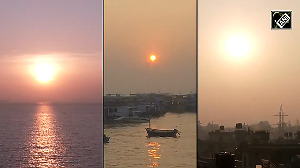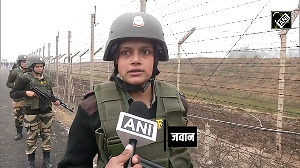The Ajmer dargah blast along with some other recent terror attacks, including the one in Hyderabad, are likely to figure high on the agenda of anti-terror talks between India and Pakistan in New Delhi next week.
Official sources said New Delhi will raise its concerns over the spate in terrorist activities, the latest being the blast in Ajmer dargah on Thursday in which two persons were killed and 28 others injured.
During a visit to Ajmer on Saturday, Union Home Minister Shivraj Patil had suggested cross-border links to the blast that rocked the Sufi shrine.
Intelligence officials suspect Harkat-ul-Jehadi Islami may have been supported by Jaish-e-Mohammed in the Ajmer blast, as both are strongly opposed to the Sufism.
HuJI operative Shahid Bilal, who is suspected to be the mastermind behind a series of terror attacks in Hyderabad, emerged the prime suspect of the Ajmer incident also as the modus operandi was similar to that used in Mecca Masjid blast in Andhra Pradesh capital in May this year.
Since New Delhi's queries to Islamabad on the last few terrorist strikes have remained unanswered, the second round of Indo-Pakistan Joint Anti-Terror Mechanism will provide another opportunity for India to raise incidents like the Mecca Masjid blasts in Hyderabad, Samjhauta Express explosion and attacks in Varanasi and Mumbai for discussions, sources said.
The first round of anti-terror talks was held in March and New Delhi felt it was pointless to continue with the mechanism if its concerns were not addressed. The meeting was a follow-up to the decision taken by Prime Minister Manmohan Singh and Pakistan President Pervez Musharraf in Havana last year to hold quarterly parleys.
But, this time too India might furnish details of these incidents to Pakistan all over again, the sources said.
The Union Home Ministry said terrorist infrastructure in Pakistan and Pakistan-occupied Kashmir continued to be used by Pakistan-based and ISI-sponsored outfits like JeM, LeT and Al-Badr.
The MHA said the current strategy of these groups is to maintain continuous flow of finances to sustain their network, target vital installations and economic infrastructure, recruit and train local modules and attack soft targets like markets, mass transit systems, places of worship and congregations.
The strategy of the outfits also include creating communal tensions to drive a wedge between communities and supply hardware through land and sea routes, said the sources, adding that the Ajmer terror strike was aimed at disturbing communal harmony.
The Home Minister, while condemning the Ajmer incident, saw in the blast the hands of elements inimical to the country and said those who want to cause communal discord should not be allowed to succeed.
After the first round of talks in March, India and Pakistan decided that both sides will have the freedom to call for more information, if required. The second meeting, which should have been held in June, was delayed as Pakistan's pointsman for the discussions -- Tariq Osman Haider, additional secretary in the foreign ministry -- had retired.
The developments in Pakistan, including the Lal Masjid incident, and the sacking of the Chief Justice also led to a delay in finalising dates for the next round of talks. New Delhi had pressed Islamabad for dates in September, but Pakistan argued that there was no official to head its delegation.
Pakistan also refused to include Jammu and Kashmir in the discussions and maintained that old cases would remain out of the purview of the mechanism.
Since the last meeting in March, there have been four terrorist attacks in India, including the August 25 twin explosions in Hyderabad in which 42 people were killed. The latest is Ajmer.
Shahid Bilal, who took over the command of HuJI on October 12, 2005, has been on the list of most wanted terrorists after he masterminded a suicide attack on the Special Task Force's headquarters in Hyderabad that left one police personnel dead. Bilal is also wanted for the blasts on Samjauta Express in February that left 68 people dead.
India is also expected to seek from Pakistan a response to its demand for tracking down and handing over those responsible for terror acts. New Delhi had hinted at the involvement of elements based across the border in the Samjhauta Express blasts as it handed over to Islamabad a photo of a suspected Pakistani national believed to be involved in the terror attack.
India also gave evidence of the involvement of Pakistan-based terror groups in blasts in Delhi, Hyderabad and Varanasi and the attack on a makeshift temple in Ayodhya.
The names of six persons, including that of a suspected killer of BJP leader Haren Pandya, were also given to Pakistan. Earlier, Pakistan was given a list of 35 most wanted terrorists, including Dawood Ibrahim.
The two countries had agreed to make the anti-terror mechanism 'more meaningful, substantive and significant, involving the framework for durable cooperation on terrorism.'
Favouring a joint system to tackle terrorism, they had discussed ways to share intelligence to prevent terror attacks and steps to deal with a situation that may arise due to such incidents.






 © 2024 Rediff.com -
© 2024 Rediff.com -